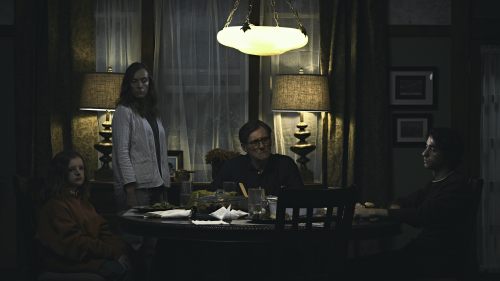The Overlook Film Festival Review: THE BAR
There’s a certain energy to an Álex de la Iglesia film, and The Bar is no different. It’s frenzied but pointed, controlled chaos, with the added focus of taking place almost entirely in a single setting.
El Bar is a grimy little establishment in downtown Madrid, run by a hard-assed older woman named Amparo (Terele Pávez) and her gentle second-in-command Sátur (a baby-faced Secun de la Rosa). Among the regulars are handsomely bearded hipster Nacho (Mario Casas), a taciturn, middle-aged woman obsessed with slot machines named Trini (Carmen Machi) and bible-ranting homeless transient Israel (Jaime Ordóñez).
But on this particular day, El Bar has a new, somewhat out-of-place patron: Elena (Blanca Suárez), a beautiful, well-to-do woman who wanders into El Bar looking for a place to charge her phone before a dating app meet-up. Not long after she arrives, a fellow patron steps outside and is immediately shot in the head from an unknown source. A second patron runs out to check on him and is felled by another head-shot. The rest of El Bar’s patrons remain inside, terrified and suspicious, for the remainder of the film.
The mystery surrounding this bar grows in scope as we watch it. When no one’s looking, the bodies outside disappear, as do their blood stains, as do the normal downtown Madrid crowds, replaced by shadowy government types in all black and gas masks. A grotesquely bloated man stumbles out of the bar’s restroom and dies on the floor, leaving behind a giant syringe. Sátur posits that maybe they’re all part of a government experiment, while two tough guys point to Nacho’s impressive beard and black bag and cry “terrorist.”
The Bar delves a bit into Islamophobia and our new, terrorism-obsessed world. “It’s like Paris,” we hear, but it doesn’t take long for us to discover that what’s going on in Madrid is something much stranger than the recent terrorist attacks in Paris.
But what, exactly, we never really learn. The Bar’s opening credits show pulsing bacteria and virus strains, and the syringes play a big part in the latter half of the film, but Iglesia leaves the specifics up to our imagination. Much like the patrons of El Bar, we’re in the dark.
That knowledge isn’t strictly necessary, anyway. The Bar is much more interested in the social experiment of several disparate adults contained in a small space in treacherous conditions. It’s a compelling trial, but would be much more so if we knew a bit more about those adults. Iglesia never takes the time to reveal much below the surface of their easy categories: homeless and fundamentalist Israel, posh fish-out-of-water Elena, unhappy housewife Trini. The only character with any real surprise to him is Nacho, but even now, I’m not sure who Nacho is, or why he does what he does. And the film suffers a bit when the characters separate and spread out, losing some of the urgency of that one-location setting. The first couple of acts are so exciting that it's perhaps unsurprising the rest of the film has trouble keeping up.
There’s some very cool physical horror to The Bar – characters oil themselves down to squeeze through a much-too-small sewer entrance, a woman’s hands are horribly burned, that grotesque man from the bathroom stares blindly out of milky eyes as his skin stretches and bulges. But the real horror of The Bar remains in the way we respond to fear. The truism “Fear changes people” is offered, and is answered with a statement that’s even truer: “No, fear shows us who we really are.”



